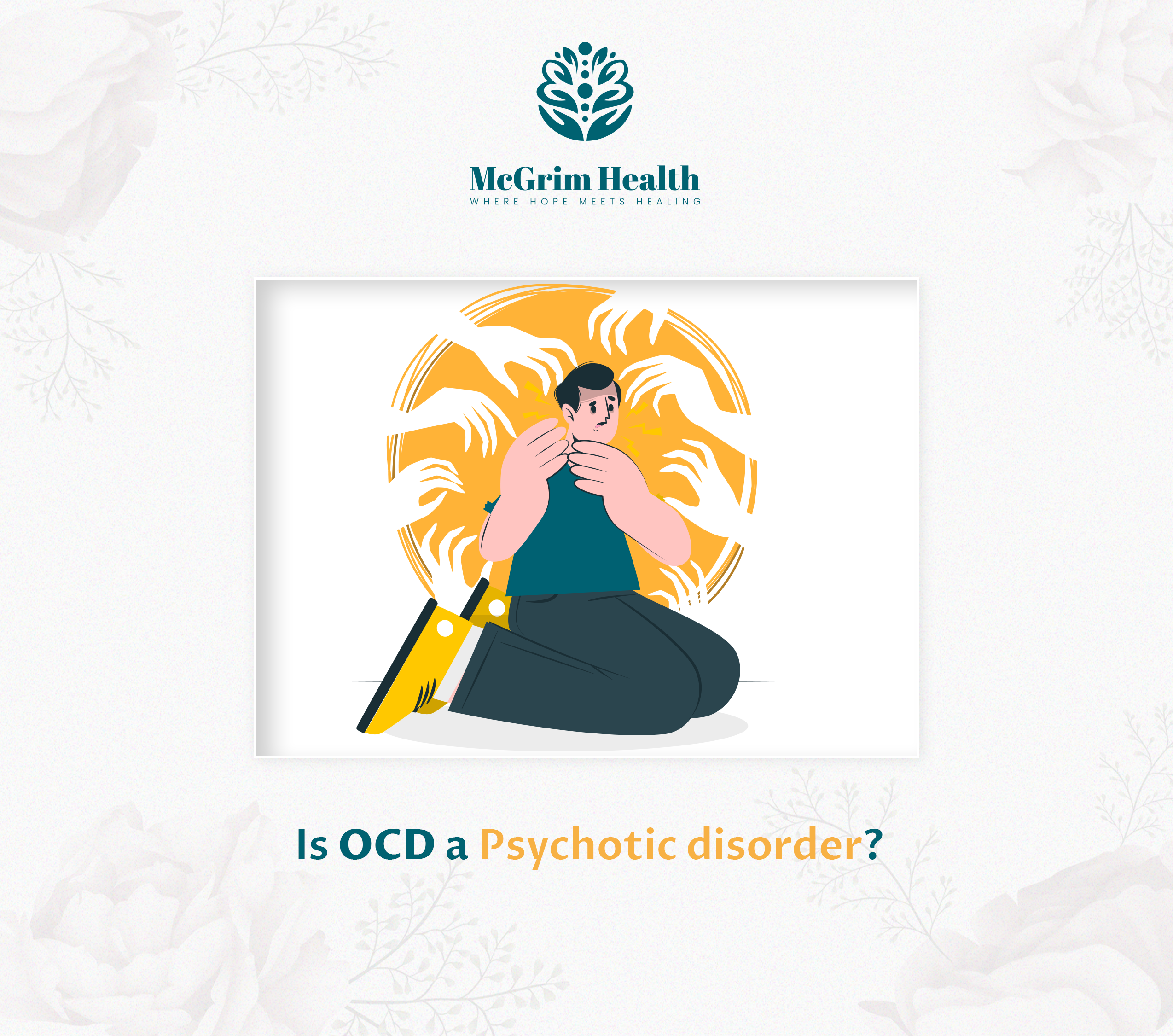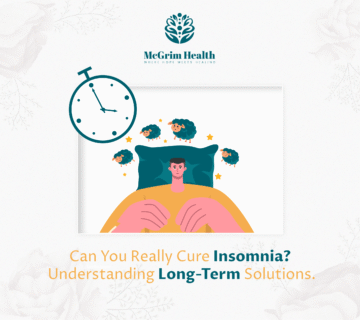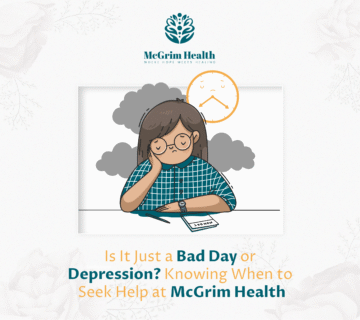Obsessive-Compulsive Disorder (OCD) often confuses people. Some individuals confuse it with psychosis. OCD involves strong compulsions and obsessions. These feelings are very powerful.
Individuals with OCD might think their thoughts or actions are driving them “crazy” or that they might lose touch with reality. But is OCD a psychotic disorder?
Let us look at how OCD differs from psychosis. OCD can sometimes seem to have psychotic features. It is important to understand the link between OCD and psychosis clearly.
At McGrim Health, we focus on your mental health. The center designs plans for your unique needs, offering medication and continuous care. Our specialized teams stand ready to help with various mental health issues. Contact us for support.
What is Obsessive-Compulsive Disorder (OCD)?
Obsessive-Compulsive Disorder (OCD) is a long-term mental health problem. It is marked by unwanted, repeated thoughts (obsessions) and actions (compulsions).
People do these to lessen the unease these thoughts bring. The compulsions don’t always link to the obsession. But, they are done to ease discomfort.
Symptoms of OCD
The two primary components of OCD are obsessions and compulsions. People with OCD often experience:
- Obsessions: Constant and unasked-for thoughts, pictures, or impulses result in major worry. This includes fears of contamination, harming others, and disorder.
- Compulsions: Compulsions are actions or thoughts done repeatedly. They help reduce the worry caused by fixations. Usual compulsions involve cleaning, verifying, tallying, or organizing things in a particular sequence.
OCD can significantly affect daily life, making tasks difficult. If not treated correctly, the symptoms could get worse.
Despite hurdles, OCD is not a mental disorder causing loss of reality. People with OCD stay completely connected to the real world.
What Is a Psychotic Disorder?
Mental conditions like psychotic disorders often disconnect people from actuality. Individuals experiencing these issues encounter false beliefs, visions, and chaotic thoughts. These symptoms can deeply alter their understanding of their surroundings.
Common Psychotic Disorders
The most well-known psychotic disorders include:
- Schizophrenia: It’s a long-term disorder. It causes visions and false beliefs commonly. It also causes serious difficulties in thinking and understanding.
- Schizoaffective Disorder: It’s a situation. You notice traits of mood conditions in it, like depression or mania. But that’s not all. There’s also psychosis involved.
- Delusional Disorder: It’s a situation where people have strong false beliefs yet aren’t as severely impacted by thought and action as in schizophrenia.
People with psychotic disorders, different from OCD, tend to have severe reality disconnections. This can lead them to struggle with identifying what’s real and what’s not.
OCD vs Psychosis: Key Differences
To clarify, let’s examine some key differences between OCD and psychotic disorders:
- Awareness of Reality: People with OCD know their thoughts and actions are illogical. In contrast, those with psychosis lose touch with reality. They can’t tell what’s real. This difference affects daily life.
- Nature of Symptoms: OCD is driven by anxiety. It leads to fears of germs or danger, causing repetitive actions. Psychosis, however, distorts reality. It induces visions and misconceptions. Each condition has unique symptoms.
- Treatment Approaches: Both conditions use therapy and medication, but the methods differ. OCD responds well to Cognitive Behavioral Therapy and SSRIs. Psychosis usually requires antipsychotics. Each condition needs a specific treatment plan. On-point diagnosis is central to effective healing.
Is OCD a Psychotic Disorder?
No, OCD is not a psychopathic issue. OCD and psychotic disorders both cause deep distress. But, they are very different. Their symptoms, causes, and treatments don’t match.
Though they might seem similar at first, they are distinct. Each requires a unique approach to diagnosis and care.
Why OCD Is Not a Psychotic Disorder?
-
Cognitive Insight
People with OCD can tell their obsessive thoughts from reality. They recognize their fears and compulsions are excessive but can’t control them due to anxiety.
-
No Delusions or Hallucinations
OCD lacks the delusions and hallucinations found in psychotic disorders. Thus, people with OCD remain in touch with reality. Their distress comes from intrusive thoughts, they are not disconnect from reality.
-
No Break from Reality
Psychosis causes a break from reality. It leads to chaos. OCD, however, involves constant worry and rituals. People with OCD realize their actions are pointless.
Both conditions are unique and harmful. Psychosis alters perception. OCD limits behavior.
-
Functioning in Reality
OCD allows for some level of functioning, despite its disruptions. People with OCD can work and socialize. In contrast, psychosis severely disrupts daily life.
It hampers relationships and social interactions. However, those with OCD can maintain these connections.
Can OCD Lead to Psychosis?
Untreated OCD rarely leads to psychosis, but its anxiety can distort reality.
OCD doesn’t cause psychosis, yet severe cases can lead to intense distress. This distress may increase the risk of psychotic symptoms.
As anxiety grows, the line between fear and reality blurs. Timely treatment is essential. It helps manage symptoms and prevents worsening. Early help protects mental health.
It stops OCD from leading to depression or other issues, reducing the risk of psychosis.
OCD with Psychotic Features
People with OCD often have strange thoughts similar to delusions. They fear disasters unless they perform rituals. Unlike those with psychosis, they recognize their thoughts are irrational.
Yet, they still feel driven to act on them. This overlap makes it hard to diagnose and treat OCD. Awareness of these differences is vital.
Compulsive Speech OCD
Some OCD sufferers compulsively speak, repeating words or talking a lot. This behavior aims to reduce anxiety, not indicate psychosis.
Unlike schizophrenia, which involves illogical speech, OCD speech is logical. It’s a response to unwanted thoughts, unlike the confused speech in other disorders.
Compulsive talkers are aware of their environment. They use speaking as a way to cope with internal pain.
Obsessive-Compulsive Schizophrenia
Schizophrenia and OCD are two distinct disorders. They both involve odd behaviors and intrusive thoughts.
Schizophrenia brings on things like hallucinations and delusions, while OCD is about obsessions and compulsions, all without losing touch with reality.
But, someone could have both. It is known as “comorbid OCD and schizophrenia.”
OCD and Paranoia
People with OCD might experience paranoia. Paranoia and OCD often occur together. This is especially true for those with OCD about psychosis or the OCD fear of going crazy. The anxiety from obsessions can lead to irrational fears.
For instance, they’re afraid of not completing their routines
However, does OCD cause paranoia? Paranoia in OCD differs from that in psychotic disorders. OCD paranoia is linked to specific fears.
In contrast, psychosis paranoia involves an irrational belief. It is that others want to harm or control you.
Can OCD Cause Hallucinations?
In OCD sufferers, severe anxiety can sometimes distort sensory perception. However, this is different from psychotic hallucinations.
Such experiences are rare and occur only in extreme cases of OCD. They are not typical symptoms. These sensory changes are caused by intense anxiety, not by psychosis. This distinction is important for mental health diagnoses.
Treatment for OCD and Psychosis
If you or someone you know has OCD with psychosis, get help immediately. Treatment depends on the presence of psychosis. Common treatments include:
-
Cognitive Behavioral Therapy (CBT)
Cognitive Behavioral Therapy (CBT) acts as the chief therapy for OCD. It helps patients face irrational thoughts. CBT teaches them to spot distorted beliefs.
It also guides them to respond better to obsessions. By challenging their compulsions, individuals can break harmful habits. They then adopt healthier coping strategies.
-
Medication
SSRIs improve serotonin to relieve OCD. Antipsychotics can help with psychosis.
Doctors carefully prescribe these medicines to target brain chemicals. This approach reduces troubling thoughts and actions. Often, a mix of drugs and therapy works best.
-
Combination Therapy
For OCD and psychosis, therapy and medication work well together. Medications focus on psychotic symptoms.
Meanwhile, therapy addresses compulsive behaviors. This joint strategy is often best. It handles both conditions at once.
Conclusion: Is OCD a Psychotic Disorder?
So, Is OCD a psychotic disorder? No, it isn’t. OCD represents a cycle of recurring thoughts and obligatory actions. Alternatively, psychotic disorders present delusions and hallucinations.
Psychosis and OCD can rarely combine, especially with psychotic symptoms. So, encouraging treatment for severe cases is crucial. Early help improves outcomes and well-being.
If you have OCD with psychotic features, see a mental health expert. It includes paranoid thoughts or compulsive speech. Effective therapies exist.
You can pursue a wealthy life with help. Better care starts with understanding OCD and psychosis differences.
FAQs
Can religious OCD be cured?
Therapy and medication can effectively manage religious OCD. While a complete cure isn’t possible, treatments reduce symptoms.
Can untreated ADHD cause psychosis?
Unmanaged ADHD doesn’t lead to psychosis, but it increases the risk. It causes severe stress and anxiety. These, in turn, may result in psychotic symptoms. Therefore, timely treatment is vital.
Is paranoia a symptom of OCD?
Yes, paranoia may represent a quality of OCD. It frequently arises from unreasonable anxieties or unwelcome thoughts.





No comment